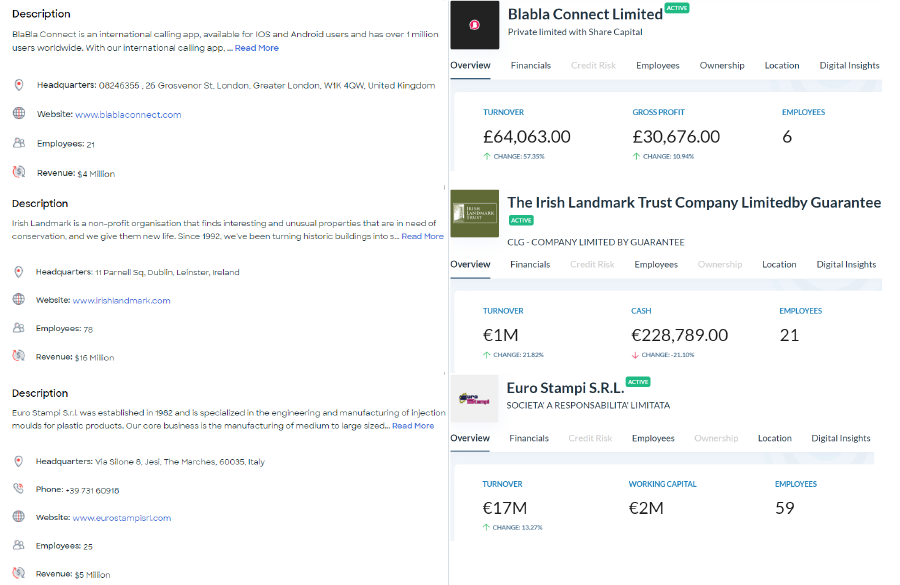Regardless of who, when and where - he who has more accurate information has the advantage over competitors. Be it a small or medium enterprise or an international conglomerate, a niche or a well-developed vertical clustered in a certain region, the more real the data one holds, the easier it is to gain an edge over other players on the market. This has long been true, yet our digital era has put more emphasis on the value of data and the products offered by data providers, in the form of structured and filterable databases.
Unfortunately, the value of these products is misinterpreted and not only by users but by the providers themselves too. Some data providers do not spare the users by listing misleading or approximated information, while users trust these providers without checking data sources and accuracy. Fundamental business decisions should rely on officially provided intel only, and this is what today’s article is about.
There is a common misconception of the availability of data and price one would pay to get access to it. First and foremost, when talking about company intelligence - most of it is publicly available. However, this intel has a few essential peculiarities to it. For starters, it is oftentimes really hard to find. Then, it should be manually collected and structured to a more or less usable form, be it a spreadsheet or some type of database. And, most importantly, it should further be maintained up-to-date to bear any value at all.

Add to that the nescience of the total number of the companies that correspond to the criteria that matter to you. Amplify the task with the effort to first find as many relevant businesses as possible and then selecting among them those that fit your lead scoring qualifications. Multiply the required effort to find, pick and maintain the company intelligence you’ve collected by the number of companies on the market of your interest (hopefully you already know it at this point). As such maintenance requires a lot of manual effort or costly automation, chances are high that you will not find this type of solution for free or on the cheap, especially if you’d be looking for one on a global scale.
Risks Borne by Data Originating from Non-Official Sources
Generally, when you apply to data solutions’ providers display information that is not based on officially published company intelligence, you may result in missing some opportunities due to:
-
Incompleteness. If your provider refuses to offer you a guarantee for the information provided, do not be surprised to receive incomplete data. Of course, the missing pieces may not be crucial to your particular goal, and thus the database does not become useless for you. However, you should be ready to see a certain share of cells or fields empty (or N/A), hence you should not set high expectations for the results achievable.
-
Inaccuracy. No matter the type of data you are looking for, these are useless when obsolete. Average data decay rate is about 2%-3% per month (!), and you can easily calculate how much of the data you have at hand becomes counterproductive in one year only. Continuous maintenance and updating require effort, time and money, while data providers sometimes do not have the necessary resources. Therefore, even if at the point of its collection the dataset was accurate, it might well not be at the moment you are getting it. Using old data may affect your sender reputation due to reaching out to invalid or incorrect email addresses or repeatedly hitting the spam folder; you may face the frustration of being prepared for the demo or cold call based on wrong or obsolete data, contacting the wrong person or calling the wrong number, to name just a few.
-
Falsehood. Unfortunately, there are company intelligence directories that feature approximations instead of real data, be it based on industry, size or any other characteristic of the business. The fluctuation of the estimation versus real data may vary from company to company, and for some be miles away from their real situation. Founding your strategies and plans on these assessments bears great risks.

-
Illegality. It is no secret that many internet users, including B2B companies’ representatives, willingly offer their information and contact data in exchange for some goodies, e.g. whitepapers, toolkits, free trials and so on. They might even agree to sign up for the offering party’s newsletter. Yet it is very likely that they do mind their data being sold to third parties. Transmitting personal data (in GDPR terms) without consent is prohibited, in most cases. Therefore, using such intel for marketing purposes is illegal and you risk being accused of breaking the law and end up with lots of displeased contacts as well as harmed reputation. Ask your data provider about the ways you can use the intel they are offering to make sure you stay compliant.
-
Objections. No matter who you are going to contact using various company databases, these people may inquire into the source of the data you have on them. You must be honest about it. Do expect them to get mad. However, only in the case of officially obtained data, you can both prove and argue the legality of the usage of this information.
Not-That-Obvious Issues Related to Company Databases
It’s been a while since we published a post about the main features of reliable data providers you should consider when choosing yours. However, in our own experience, we’ve encountered some issues regarding data accuracy, that we have not touched on before. And these are based mainly on the unreliability of the sources data providers use.
First of all, let us consider LinkedIn. It is a well-known platform that proved to be helpful especially for the B2B world. However, when considering it as a source for company intelligence directories, is it actually that good? The answer is not really, and it is not LinkedIn’s fault, of course. If you ask us why - the answer is simple. The information listed in each person’s profile is provided by the person himself/herself. Oftentimes, this information is incorrect, showing, for example, that the individual holds a managing position in a company, just for the sake of future benefits (e.g. better or higher position with the next employer). There are no legal acts whatsoever that would regulate the job-related information one features in his/her social profile. Displaying deceiving information is not uncommon, and that’s backed by a wide range of reasons. The information displayed on personal profiles is not official data and therefore might lead you to unproductive decisions and waste of resources.
Yet another unpleasant discovery was the use of approximations we found displayed by some B2B intel directories. In the image below, you can see a data provider’s featured information for a company on the left-hand side, and on the right-hand side you see data comprised in the Global Database business directory, the latter being based on official data sources only. No matter what these approximations are based on - industry, region, type of company and/or other - these are far from the truth, and hence may bear severe consequences to their users.

Erroneous data showed by business directories may result in:
-
Inaccurate selection of companies. One of the main functionalities offered by many platforms is given by the segmentation tools on tap. However, no matter how well these are set up, they will not display accurate data, because the initial input is wrong. For example, if you are looking for businesses in the UK that have reported revenue of less than 3M GPB for the last year, location and revenue would be the two filters you’d rely your research on. You do get a result taking the form of a list. Yet, what you do not know is that for a series of these companies, input for revenue was estimated, not taken from an official source. Therefore, in reality, there are companies that do fit your criteria, however did not make it to the respective list. Similarly, other companies that did not record this revenue for the given year made it to your list, because the input was based on assumptions. For you, this means that you will end up using erroneous information, and you have no idea of what the accuracy rate of the data you get actually is.
-
Misguided assessment of the total addressable market. When entering a market, or building a strategy for the upcoming periods, you need to conduct in-depth market research, and base your plans accordingly. Without knowing the true situation on the market, your company will not be able to estimate its potential correctly, and the consequences could be fatal.
-
Poor due diligence. Due diligence is one of the crucial processes for many companies. It may be performed for a wide range of purposes, be it prospecting, transactions with small business partners or imperative M&A deals. Depending on the goal, as well as the importance and magnitude thereof for your company, you should be able to imagine the extent of the consequences of due diligence based on misleading information calculated on approximations or unreliable non-official data sources.
These are just the tip of an iceberg, just a few examples where your business might end up heading when you’re not using data officially obtained.
To sum up...
Make sure, when you use a data provider’s solutions, that all the sources they use are official (e.g. Companies House), reliable, and that they do offer you guarantees with regard to the accuracy rate they promise. Note, that no company intelligence platform will be 100% accurate, so if you’re hearing a provider saying that, you should not trust them right away. Sometimes, it is better to opt for a B2B platform that offers you a relatively lower accuracy or coverage rate, yet guarantees you that all the data is based on official sources only. This will save you time, effort and resources while minimizing the risk of you getting into data trouble.